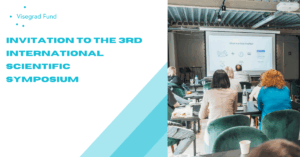International Scientific Symposium on Inclusive Education in Central and Eastern Europe
On January 16–17, 2025, a unique international scientific event was held, dedicated to inclusive education in the Visegrad Group countries. The symposium was organized virtually as part of the project „Structures of uncertainty: inclusive education in Central and Eastern European countries.” The host of the event was Ambis University (Czech Republic), and the co-organizers were the University of Prešov (Slovakia), the University of Debrecen (Hungary), and the University of Silesia in Katowice (Poland), which acts as the main coordinator of the entire international project.
The Structures of uncertainty project focuses on analyzing, developing, and promoting inclusive education in Central and Eastern Europe. Its main goal is to identify the barriers and opportunities related to the implementation of inclusive education in countries such as Poland, the Czech Republic, Slovakia, and Hungary. The symposium represented a key stage in pursuing these objectives and enabled the exchange of experiences, good practices, and research findings among experts from the four countries.
Inclusive Education – Key Challenges and New Perspectives
Inclusive education is a pedagogical approach that assumes all children—regardless of their individual needs, abilities, or disabilities—have the right to be educated together within the mainstream school system. This approach sets high expectations not only for teachers but also for the entire education system, which should be flexible, open, and ready to implement solutions tailored to the diverse needs of students.
During the two-day symposium, many aspects of inclusive education were discussed. Experts from the Czech Republic, Slovakia, Hungary, and Poland shared their experiences in working with students with special educational needs, presented research findings, and reflected on the future of inclusive education in the region. Topics included teacher preparation, the role of educational counselors, support systems in schools, and how students with disabilities are perceived by their peers and the school community.
Day One – Perspectives from the Czech Republic and Slovakia
On Thursday, January 16, 2025, participants had the opportunity to listen to presentations by experts from the Czech Republic and Slovakia. In the opening session, Dr. Dorota Prysak from the University of Silesia, the project leader, presented the project’s key assumptions, objectives, and results achieved so far.
Then, Assoc. Prof. Martin Kaleja, Ph.D., MBA (Ambis University), and Dr. Jarmila Žolnová (University of Prešov) discussed the current state of inclusive education in their countries, highlighting both achievements and challenges facing the Czech and Slovak educational systems. Another presentation—by Dr. Lenka Gulová—focused on the inclusion of students with disabilities in higher education in the Czech Republic. Topics also covered special educational interventions and the role of educational counselors.
The day concluded with an open meeting with teachers, providing space to exchange practical experiences and showcase initiatives undertaken in schools to support students with special educational needs.
Day Two – Perspectives from Hungary and Poland
On Friday, January 17, 2025, the main speakers represented Hungary and Poland. Experts from the University of Debrecen and the University of Silesia presented research findings and ongoing projects related to inclusive education. Discussions also addressed modern approaches to supporting students and the development of competences among teachers and students in pedagogical fields.
The Polish team also presented innovative tools supporting the education of students with diverse needs. Attention was drawn to the necessity of educating pedagogical staff in the spirit of openness, empathy, and interdisciplinarity, as well as to the role of schools as spaces for building community and strengthening social inclusion.
Who Was This Event For?
The symposium was aimed at a wide audience. It brought together primary and secondary school teachers, pedagogues, school psychologists, staff of psychological-pedagogical counseling centers, university academics, students in pedagogical fields, educators, and parents of children with special needs. The open format allowed participation by both professionals and anyone interested in the topic of inclusion in education.
Thanks to its online format, the symposium reached a broad audience from various countries. Participants had the opportunity to engage actively, ask questions, comment on presentations, and share their own reflections. A recording of the symposium was made available on YouTube, allowing it to be watched even after the event.
📺 Watch the event recording: https://youtu.be/ku8kXo-F5W8
The Importance of the Project for the Development of Inclusive Education
The Structures of uncertainty project is interdisciplinary and international in scope. It focuses on the exchange of experiences, identification of good practices, and creation of innovative solutions in the field of inclusive education. Its outcomes are relevant not only for academic environments but also for schools, educational institutions, and organizations supporting children and youth with diverse needs.
Organizing the symposium was another important step in achieving the project’s goals. Thanks to the collaboration between researchers and practitioners, it was possible to develop new perspectives and propose actions that support inclusivity in the educational systems of Central and Eastern Europe.


